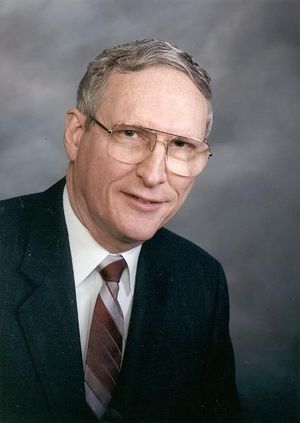Donald C. Cox
- Birthdate
- 1937
- Associated organizations
- Bell Labs
- Fields of study
- Communications
- Awards
- IEEE Morris E. Leeds Award, Marconi Prize in Electromagnetic Waves Propagation, IEEE Alexander Graham Bell Medal
Biography
Donald C. Cox received the B.S. and M.S. degrees in Electrical Engineering from the University of Nebraska in 1959 and 1960, respectively; the Ph.D. degree in Electrical Engineering from Stanford University in 1968; and an Honorary Doctor of Science from the University of Nebraska in 1983. He did communications system design at Wright-Patterson AFB, Ohio, from 1960 to 1963. As a member of Technical Staff at Bell Laboratories from 1968-1973, he researched dynamic channel assignment techniques that are being considered today for new digital cellular systems, cordless telephones, and personal communications systems. Dr. Cox also measured time delay spreads in mobile radio multipath propagation that are being used in new digital cellular systems design. In the 1970s, he supervised and contributed to millimeter-wave earth-space propagation experiments that provided information for designing satellite communications systems.
In 1978, before cellular radio started in the U.S., and before cordless telephones were popular, Cox began research aimed at personal portable communications. This pioneering work triggered activity worldwide. By collecting what was known then about low-power digital radio technology and radio propagation in and around buildings, making extrapolations where needed, he showed technical possibilities for providing economical pocket-carried personal portable communications to most of society. Cox then initiated research to address questions identified in his 1978 system proposal. He ran computer simulations to determine the performance of randomly oriented handset antennas, including diversity. He extended analysis of frequency reuse system architectures, and supervised the first measurements of propagation over short radio paths into buildings. Interconnection network and network intelligence needs were also delineated.
In 1983, with the breakup of the Bell System, Cox organized and led a Radio Research Department that became a Bellcore Research Division on 1 January1984. His division addressed wireless access to networks for personal communications. With his leadership and active participation, the division explored and made significant contributions to all aspects of this topic r. including: radio link architectures and techniques, radio systems, radio propagation, infrastructure network, and low-power signal-processing technologies and architectures. This work stimulated research, system design, and regulatory .activities worldwide. Radio system concepts and technology have been transferred by Dr. Cox and his Radio Research Department to Bellcore Requirements and Network Projects, and are being considered for possible U.S. standards.
Cox received the Bellcore Fellow Award, 1991; the IEEE Morris E. Leeds Award, 1985; the Marconi Prize in Electromagnetic Waves Propagation from the Institute for International Communications (Italy), 1983; and three IEEE Society Prize Paper Awards, 1992, 1990, 1983. He is a Fellow of the IEEE and of the AAAS.
He is married to Dr. Mary Alexander Cox; they have two children, Earl and Bruce.
Dr. Cox received the 1993 IEEE Alexander Graham Bell Medal 'For pioneering and leadership in personal portable communications.'
